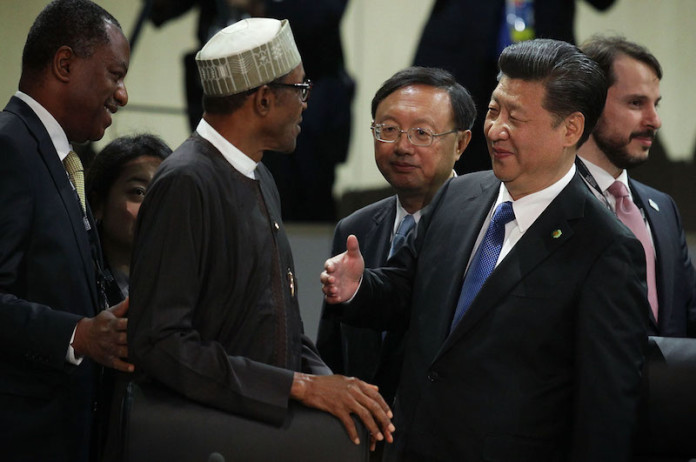
Africa’s evolving status as the last frontier for trade and investment is currently sitting well with foreign investors, with a flurry of overtures already being dangled by developed economies that are willing and ready to do business with the continent. But Nigeria, as Africa’s largest economy, has to prepare herself to get the lion’s share of the wave of investments being anticipated on the continent in the months ahead.
Naturally, Nigeria has the potential to lead the rest of Africa. Blessed in mineral and human resources, experts say Nigeria offers some of the best returns on investment anywhere. This is why the country played host to two world leaders, Theresa May of the United Kingdom and Angela Merkel of Germany, who made whistle-stop tours of the continent last week. Their visits, coming three days apart, actually made it three European heads of government to visit Abuja in two months, after Emmanuel Macron of France had called in July.
Besides the visits, over 50 African leaders, including Nigeria’s President, Muhammadu Buhari, also visited China for the Summit of the Forum on China-Africa Cooperation. The summit, mainly on economic cooperation, explored areas in which the continent could further deepen the existing business relations with the world’s second largest economy, which incidentally is also the single biggest investor in Africa.
Quoting the European Commission, McKinsey and UK Department for International Trade, the BBC said the UK’s trade volume with Africa stood at $36 billion in 2015, compared to the European Union’s $305 billion; China’s $188 billion and the United States’ $53 billion. Yet, the former dominant colonial power plans to become Africa’s top Group of Seven investment partner by 2022. Speaking with an eye on next year’s Brexit deal, May said, “I want to see strong African economies that British companies can do business with in a free and fair fashion.”
With such competing interests, there is no doubt that this is shaping up into a win-win situation for Africa and, indeed, Nigeria. In fact, besides mere jawing away with African leaders, China demonstrated its readiness to match words with action by announcing a $60 billion investment package for Africa, which is very heartening for a continent whose image is clearly defined by poverty, conflict and disease.
However, the rush to ramp up economic relations with Africa is not altogether surprising. With the European Union challenged by the impending withdrawal of Britain from the economic bloc, there is the need for May and indeed the entire Europe to expand their frontiers of trade to Africa, a virgin continent replete with opportunities. While China is currently engulfed in a trade war with Donald Trump’s United States of America, Europe is also facing hostilities from the world’s largest economy and hitherto most trusted political, military and economic partner.
While May signed a treaty, promising increased support to Nigeria in her seemingly endless war with Boko Haram, Merkel was more concerned about curbing the influx of illegal immigrants from Nigeria into her country. Of course, Merkel is also interested in investing in Nigeria and came with a team of top business executives from her country, eyeing agriculture and other productive sectors, just like May. The German leader believes the best way to keep Nigerians from the treacherous Sahara Desert-Mediterranean route to Europe is by ensuring that the Nigerian economy can create jobs and retain the fleeing youth.
Despite the bright prospects, however, Nigeria has to be ready to take advantage of the promising situation. The government has to sit down and decide what is best for the country. What Nigeria needs now is partnership, not a relationship in which the country becomes a dumping ground for finished products from companies in the UK in exchange for raw agricultural products. Nigeria has to be in a position to export finished and semi-processed products to the UK.
Right now, Nigeria has serious security challenges and a huge infrastructure deficit, especially concerning steady power supply and transport infrastructure. With power supply averaging about 5,000 megawatts for almost 200 million people, what kind of manufacturing can take place under such an economy? The government has to seize this opportunity to get the Britons and Germans to help in the power sector. The ports are mostly uncompetitive, while the aviation sector is in a shambles. These are areas that need urgent attention.
The usual claim of having the largest population is not enough. Speaking in Birnin Kebbi, the Kebbi State capital, last year, the Minister of Education, Adamu Adamu, said between 65 million and 75 million Nigerians were illiterate. What is the advantage in a population with such a high illiteracy rate? What is the use of population that is predominantly poor, with Nigeria being adjudged home to the largest number of poor people on earth?
What is clear is that Nigeria is in competition with other African countries. May, for instance, visited South Africa and Kenya along with Nigeria. If the Nigerian environment is not competitive enough, then investors will move to other stable and competitive countries. For instance, is it not embarrassing that Nigeria is languishing at the 145th position in the World Bank Doing Business 2018 report? Yet, this is an improvement from the previous position of 169th.
For instance, Volkswagen recently signed a memorandum to revive its plant in Nigeria and, at the same time, is trying to set up a plant in Ghana. If the Nigerian plant established in the 1970s had remained functional, it is highly unlikely that there would have been any need for another one in Ghana. So Nigeria has to be ready to reap from a likely investment flow into Africa or risk losing it all to other countries, which have the infrastructure, are less corrupt and have a more transparent business environment.
END

Be the first to comment